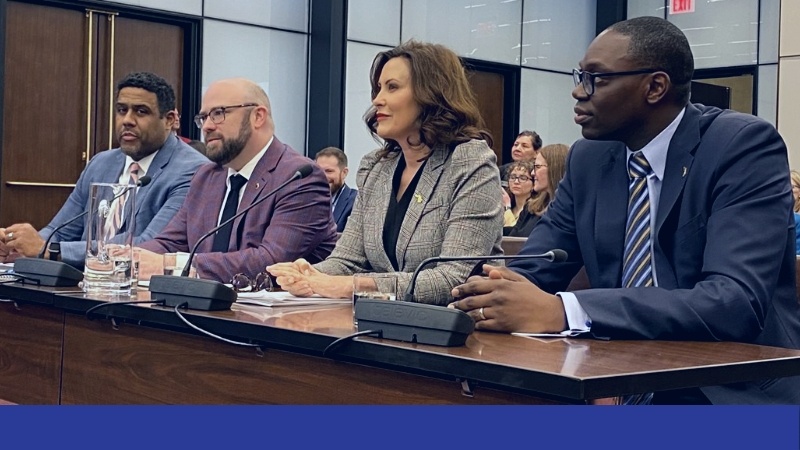
LANSING, Mich. — Earlier today, Gov. Gretchen Whitmer released her fiscal year 2024 budget proposal. MCAN was encouraged to see bold investments in postsecondary education, as well as increased financial support for K-12 and early childhood education systems.
Statement from Michigan College Access Network Executive Director Ryan Fewins-Bliss:
“Budgets reveal a state’s priorities, and Gov. Whitmer’s budget proposal shows that she understands the economic importance of getting more Michiganders to and through college. Her proposed $730 million in postsecondary education funding in support of Sixty by 30 would provide a much-needed boost to a higher education system still dealing with the fallout of the COVID-19 pandemic and help more Michiganders gain vital skills needed to succeed in the modern workforce. The proposed 4% ongoing funding increases for public universities and community colleges will strengthen these institutions and help keep student costs down.
We support the proposed expansion of Michigan Reconnect by lowering the age of eligibility from 25 to 21, a move that would make tuition-free community college a possibility for thousands more Michigan residents. This program gives adult residents who are looking for a brighter economic future a chance to pursue a valuable degree or certificate through our state’s robust network of community colleges.
We are also excited to see a new Michigan Reconnect bachelor’s degree pathway for high school graduates from the classes of 2020, ’21 and ’22 who have nearly completed a degree program, but whose college journey was disrupted by the pandemic. It is vital that we re-engage these young adults and put them on a path toward college completion and greater career possibilities.
We also support Gov. Whitmer’s plan for the Michigan Achievement Scholarship, which invests $50 million in one-time funding, as well as $50 million per year in ongoing funding, to ensure that the scholarship is solvent and can deliver on the promises made to students and families. This is a transformational scholarship, and our students deserve the financial support to pursue fulfilling careers and economic independence.
Outside of higher education, we support Gov. Whitmer’s proposed investments in the K-12 system, including the largest per-pupil allocation in history, as well as her plan for universal free preschool. Building the foundation for successful lives and careers begins well before students set foot on a college campus, and we are encouraged to see proposed investments that will help prepare students for prosperous futures.
These proposals will help ensure that all Michigan students — especially low-income students, first-generation college-going students and students of color — have the opportunity to attend college and gain the skills needed to thrive in the 21st century workforce. As Gov. Whitmer works with the legislature in the coming months to negotiate a final budget, we encourage them to make bold, bipartisan investments in the future of our state.
We appreciate the governor's commitment to achieving our shared goal of Sixty by 30, one of her administration’s key priorities since her first year in office. The funding proposed today would be an incredible force for good on behalf of Michigan's students and families.”
Supporting Data
The budget proposed by Gov. Whitmer addresses some of the most pressing needs in the Michigan economy. In recent weeks, new data from Lumina Foundation and the National Student Clearinghouse Research Center have revealed optimistic signs, as well as reasons for continued urgency, in Michigan’s pursuit of Sixty by 30. Lumina Foundation’s A Stronger Nation report, which tracks college attainment in the United States, released its 2021 data, and it shows Michigan has reached an attainment rate of 46.5%, an increase of 1.7% from 2019. This is an encouraging trend, especially considering the impacts of the COVID-19 pandemic, but it still falls short of the pace we’ll need to reach 60% by 2030.
There were similarly mixed signs in the National Student Clearinghouse Research Center’s fall 2022 enrollment estimates. The data show that enrollment declines have stabilized following significant drops in the preceding years. Michigan colleges across all sectors dropped less than 1% in total enrollment from fall 2021 to fall 2022. Stability isn’t enough, though. Michigan businesses are already struggling to find talent, and we need to turn this trend upward to counteract pandemic enrollment losses and keep Michigan students on track for greater economic opportunities.
Proposed investments in postsecondary education supported by statewide, national data